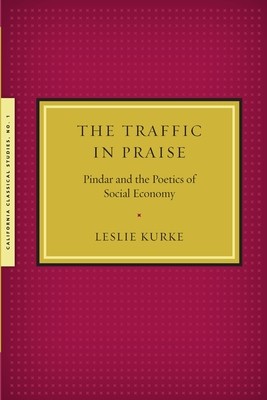
- We will send in 10–14 business days.
- Author: Leslie Kurke
- Publisher: California Classical Studies
- Year: 2013
- Pages: 268
- ISBN-10: 1939926009
- ISBN-13: 9781939926005
- Format: 15.2 x 22.9 x 1.6 cm, softcover
- Language: English
- SAVE -10% with code: EXTRA
Reviews
Description
Pindar's epinikia were poems commissioned to celebrate athletic victories in the first half of the fifth century BCE. Drawing on the insights of interpretive anthropology and cultural history, Leslie Kurke examines the odes as public performances which enact the reintegration of the athletic victor into his heterogeneous communities. These communities-the victor's household, his aristocratic class, and his city-represent competing, sometimes conflicting interests, which the epinikian poet must satisfy to accomplish his project of reintegration. Kurke considers in particular the different modes of exchange in which Pindar's poetry participated: the symbolic economy of the household, gift exchange between aristocratic houses, and the workings of monetary exchange within the city. Her analysis produces an archaeology of Pindar's poetry, exposing multiple systems of imagery that play on different shared cultural models to appeal to the various segments of the poet's audience.
EXTRA 10 % discount with code: EXTRA
The promotion ends in 19d.20:43:22
The discount code is valid when purchasing from 10 €. Discounts do not stack.
- Author: Leslie Kurke
- Publisher: California Classical Studies
- Year: 2013
- Pages: 268
- ISBN-10: 1939926009
- ISBN-13: 9781939926005
- Format: 15.2 x 22.9 x 1.6 cm, softcover
- Language: English English
Pindar's epinikia were poems commissioned to celebrate athletic victories in the first half of the fifth century BCE. Drawing on the insights of interpretive anthropology and cultural history, Leslie Kurke examines the odes as public performances which enact the reintegration of the athletic victor into his heterogeneous communities. These communities-the victor's household, his aristocratic class, and his city-represent competing, sometimes conflicting interests, which the epinikian poet must satisfy to accomplish his project of reintegration. Kurke considers in particular the different modes of exchange in which Pindar's poetry participated: the symbolic economy of the household, gift exchange between aristocratic houses, and the workings of monetary exchange within the city. Her analysis produces an archaeology of Pindar's poetry, exposing multiple systems of imagery that play on different shared cultural models to appeal to the various segments of the poet's audience.


Reviews